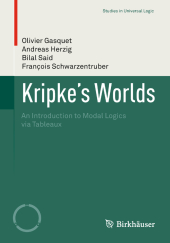 Neuerscheinungen 2013Stand: 2020-01-07 |
Schnellsuche
ISBN/Stichwort/Autor
|
Herderstra▀e 10
10625 Berlin
Tel.: 030 315 714 16
Fax 030 315 714 14
info@buchspektrum.de |

Olivier Gasquet, Andreas Herzig, Bilal Said
(Beteiligte)
Kripke┤s Worlds
By Oliveri Gasquet, Andreas Herzig, Bilal Said et al.
2013. xv, 198 S. 73 SW-Abb. 240 mm
Verlag/Jahr: SPRINGER, BASEL; BIRKH─USER BASEL 2013
ISBN: 3-7643-8503-0 (3764385030)
Neue ISBN: 978-3-7643-8503-3 (9783764385033)
Preis und Lieferzeit: Bitte klicken
Possible worlds models have been defined by Saul Kripke in the early 60ies. They provide semantics for various modal logics such as temporal logics, logics of knowledge and belief, logics of action, logics of obligation, as well as for description logics. They also give semantics for other nonclassical logics such as intuitionistic logics, conditional logics, and several paraconsistent and relevant logics. These logics have been studied intensively in philosophical and mathematical logic and in computer science, and have been applied increasingly in various domains such as program semantics, artificial intelligence, and more recently in the semantic web. For almost all of these logics there exist semantic tableaux proof systems which for a given formula allow to check whether it has a model. The present book contains a step-by-step introduction to possible worlds semantics and modal and other nonclassical logics. It is accompanied by a piece of software that allows to build models, to check whether a given formula is true in a model, and to check whether a given formula is valid in a given logic. Beyond working with existing tableaux systems, the program also allows to implement tableau systems for new logics by means of a simple interactive graph-based language accessible to readers that are not computer scientists.
Preface.- 1 Modelling things with graphs.- 2 Talking about graphs.- 3 The basics of the model construction method.- 4 Logics with simple constraints on models.- 5 Logics with transitive accessibility relations.- 6 Model Checking.- 7 Modal logics with transitive closure.- Bibliography.- Index.
From the reviews:
"This is an excellent book to use -- either as a stand-alone text or with another textbook -- for an introductory undergraduate course in logic addressed to majors in the humanities, social sciences, computer science, or mathematics. ... A basic unifying theme of the book is to construct models of possible worlds and to check formula satisfiability using graph-theoretic tableaux systems." (Russell Jay Hendel, MAA Reviews, February, 2014)
"This book provides an accessible introduction to modal logics indeed. ... The book is well written and quite informative ... . It can be used as an easy-going introduction for all who are interested in automated reasoning and need some formal tools for playing with modal logics." (Andrzej Indrzejczak, zbMATH, Vol. 1280, 2014)


